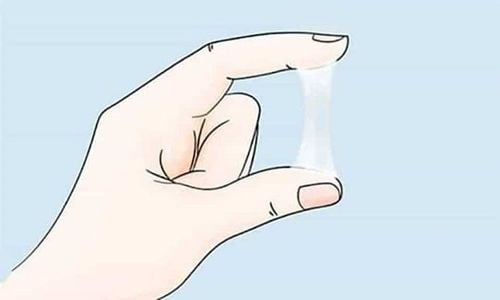Yuvafem is a form of estrogen hormone used by women to alleviate vaginal symptoms during menopause, such as dryness, burning, and itching. To ensure effectiveness, patients should follow the doctor's instructions and advice from the pharmacist.
1. What is Yuvafem used for?
Yuvafem, also known as estradiol, is a form of estrogen hormone used by women to improve vaginal symptoms of menopause such as dryness, burning, and itching. These symptoms are signs of menopause caused by the body producing less estrogen. Estrogen taken orally, absorbed through the skin, or injected may carry a higher risk of side effects due to higher absorption, so it is generally recommended to use products that are inserted or applied directly inside the vagina first.
2. How to use Yuvafem
Yuvafem is formulated in the form of a white, round, film-coated tablet and is used by inserting the tablet into the vagina. Gently insert the tablet into the vagina as directed and press the plunger to release the medication. The dosage depends on the patient's health condition and response to treatment, typically one dose per day for the first two weeks, and then twice a week thereafter.
Use Yuvafem regularly to get the maximum benefits. Never increase the dosage or misuse the medication for a longer period than prescribed. Doing so will not improve the condition but may increase the risk of unwanted side effects.

3. Side effects when using Yuvafem
Some potential side effects that may occur when using Yuvafem include:
- Nausea or vomiting
- Bloating
- Diarrhea
- Breast tenderness
- Headaches
- Weight changes
- Serious side effects: changes in mental state (such as depression, memory loss), lumps in the breast, abnormal vaginal bleeding (such as spotting, sudden bleeding, or recurring prolonged bleeding), new or worsening irritation or itching, odor, or discharge from the vaginal area, stomach pain, persistent nausea, yellowing of the eyes, dark urine, swelling of the hands or ankles, increased urination.
- Yuvafem rarely causes serious issues related to blood clots, such as heart attacks, strokes, deep vein thrombosis, pulmonary embolism, etc. However, if you experience any symptoms such as unusual sweating, chest pain radiating to the arm, sudden severe headache, weakness on one side of the body, difficulty speaking, confusion, sudden vision changes (such as partial or complete blindness), pain or redness, swelling in the leg, tingling or weakness, numbness in the limbs, coughing up blood, shortness of breath, dizziness, or sudden fainting, seek immediate medical attention.
Before prescribing, doctors always weigh the benefits and effectiveness of Yuvafem against the risks of side effects. However, in some cases, side effects may still occur. Therefore, if you notice any abnormal symptoms, particularly signs of a serious allergic reaction, such as difficulty breathing, severe dizziness, rash, itching, or swelling in the face, throat, or tongue, it is essential to notify healthcare personnel immediately for urgent intervention.
4. Some precautions when using Yuvafem
Some precautions when using Yuvafem include:
- Inform your doctor about any allergies to Yuvafem or any other allergies. Yuvafem may contain inactive ingredients that could cause allergic reactions or other serious issues.
- Inform your doctor about your medical history, especially if you have unexplained vaginal bleeding, certain cancers (such as breast, uterine, or ovarian cancer), blood clots, stroke, heart disease, liver disease, kidney disease, a family medical history (such as cancer, breast lumps, blood clots), personal or family history of certain swelling disorders (angioedema), blood clotting disorders (such as protein C or protein S deficiency), high blood pressure, diabetes, high cholesterol or triglyceride levels, obesity, lupus, thyroid disorders, calcium imbalances (high or low blood calcium), uterine issues (such as fibroids, endometriosis), gallbladder disease, asthma, epilepsy, migraines, mental health disorders (such as depression, dementia), or a blood disorder known as porphyria.
- Do not smoke or use tobacco. Estrogen combined with smoking increases the risk of stroke, blood clots, high blood pressure, and heart attacks, especially in women over 35 years old.
- Inform your doctor if you have recently undergone surgery or have been immobile for a long period (such as after a long flight). These conditions increase the risk of blood clots, especially when using estrogen products. You may need to stop using Yuvafem for a period or take special precautions.
- Yuvafem may cause dark spots on the face and increased sensitivity to sunlight. Therefore, limit direct sun exposure, use sunscreen regularly, and take other protective measures such as wearing protective clothing.
- If you are nearsighted or wear contact lenses and experience vision problems or difficulty wearing contact lenses, contact your eye doctor if any eye issues arise.
- Yuvafem should not be used during pregnancy or breastfeeding as it may reduce the quality and quantity of breast milk produced.
- Some tests such as blood pressure, breast exams, mammograms, pelvic exams, Pap smears, etc., may be required to monitor your progress and check for side effects. Perform regular breast self-exams at home as directed by your doctor.
- Preventing or managing high blood pressure, high cholesterol, and diabetes can help reduce the risk of heart disease and stroke. Lifestyle changes can help manage or prevent these conditions, including reducing stress, following a low-fat/low-salt diet, losing weight if overweight, exercising regularly, and quitting smoking. Keep your mind sharp and active with mental exercises (such as reading books, solving crossword puzzles) to help prevent dementia.
Yuvafem can be harmful if swallowed or overdosed. If you miss a dose, take it as soon as you remember. However, if the time is close to the next scheduled dose, skip the missed dose and continue the treatment as usual. Never double the dose. Overdosing on Yuvafem can lead to serious symptoms such as nausea, severe vomiting, and abnormal vaginal bleeding.

5. Drug interactions
Drug interactions may reduce the effectiveness of Yuvafem or increase the risk of side effects. Inform your doctor about all other medications you are using, including over-the-counter medications, prescription drugs, vitamins, and herbal products. Do not stop, start, or change the dosage of any medication without your doctor's approval.
Some medications that may interact with Yuvafem include:
- Aromatase inhibitors: anastrozole, exemestane, letrozole
- Fulvestrant
- Ospemifene
- Raloxifene
- Tamoxifen
- Toremifene
- Tranexamic acid
Additionally, Yuvafem may interfere with some laboratory tests and lead to inaccurate results. Ensure that medical personnel and your doctor are aware that you are using Yuvafem.
6. How to store Yuvafem
Store Yuvafem at room temperature, away from light, and in a dry place. Do not store Yuvafem in a damp area or in the freezer. Different medications require different storage methods, so carefully read the storage instructions on the Yuvafem packaging or ask your pharmacist. Keep Yuvafem out of the reach of children and pets. When the medication is no longer needed or has expired, dispose of it according to proper procedures. Do not throw Yuvafem in the trash or flush it down the toilet unless instructed to do so. Consult with a waste disposal company or your pharmacist for advice on how to safely dispose of Yuvafem to protect the environment.
In summary, Yuvafem is a form of estrogen hormone used by women to improve vaginal symptoms during menopause, such as dryness, burning, and itching. However, Yuvafem may cause some side effects and drug interactions, so it is important to inform your doctor about the medications you are using to reduce the risk of side effects and enhance the effectiveness of the treatment.
To arrange an appointment, please call HOTLINE or make your reservation directly HERE. You may also download the MyVinmec app to schedule appointments faster and manage your reservations more conveniently.
Reference source: webmd.com













